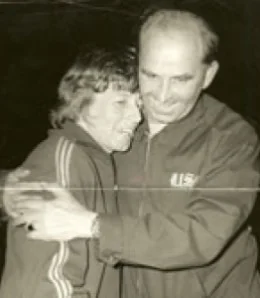
Henri Schubert was born in Chemnitz, Germany and in his younger days enjoyed athletics as a long distance runner before deciding on being a 200 and 400 metres runner. He began working with the electrical firm, Siemens in 1933. Three years later, Henri tried out for the Berlin Olympics and whilst, he did not make the German team, he did receive tickets to the Games themselves.
Henri was posted to Tehran, Iran by Siemens, but in 1941 he along with other Germans were interned with the intention of being returned to Germany. However only the women were returned and Henri and 540 other German men were shipped to India then onto Australia for internment at Tailem Bend, South Australia. Soon after he was moved to Tatura in Victoria and then at the end of World War II Henri was able to move to Melbourne and begin a new life.
In 1946 he resumed his athletic career joining St Stephens Harriers in Melbourne prompted by having met 800 metres runner and Olympic finalist and club member, Gerald Backhouse during the 1936 Olympics. Henri competed until 1948 and then, most fortunately for athletics in Australia, turned to coaching.
As it happened the men’s clubs were not interested in his European training methods and ideas. But luckily, he was approached by teammate, Jim Polan to look at a promising young sprinter, Joyce Hangar who he began working with and other members of the Collingwood Women’s Athletic Club. Henri’s long coaching career began.
By 1954 he was coaching ten women’s athletic clubs and he had also introduced the modern pentathlon to both Victoria and Australia. In 1957 he was appointed state coach by the Victorian Women’s Amateur Athletic Association (VWAAA) – a position he held until 1962.
Henri fought hard to overcome the stereotypical views at the time, that women were weak, questioning their ability to train hard. He knew otherwise. Henri believed that the athlete-coach relationship should be one of team-work and partnership. He knew the right type and length of workout needed by each individual athlete. He monitored his athletes closely and instilled confidence in them. In winter his athletes ran the ‘Tan’ and did repetition hill work. He introduced circuit training and fartlek and varied his venues from parklands to forests to beaches to road.
Henri was not a great advocate of weight training but used medicine balls in a variety of exercises. He was meticulous in recording his athletes’ performances and, of most importance, was his pre-race plan and post-race analysis.
His athletes embarked upon a long story of success at club, national and international level – among them were Pam Kilborn-Ryan, Judy Amoore-Pollock, Charlene Neighbour-Rendina, Terri Wangman-Cater, Gaye Murphy-Dell and Robyne Strong-Lorraway. He also coached Debbie Flintoff-King until just before her Seoul Olympic gold medal. Henri not only coached elite athletes but he supported and trained club athletes with equal enthusiasm and dedication.
In 1972 he was appointed coach to the Munich Olympic Team and in 1974, to the same role for the Christchurch Commonwealth Games. In 1977 he was the Oceania team coach at the first IAAF World Cup in Dusseldorf, Germany.
Henri was awarded an MBE for services to athletics in 1979.
He was a senior coach of the Australian Track and Field Coaches Association and was instrumental in setting up training camps where he coached and lectured. The Henri Schubert Memorial Award is awarded annually by ATFCA and Athletics Australia to a coach who has made a significant contribution, particularly in the area of education of he or her peers.
In 1987 he was awarded an IAAF Diploma and the Merit Award of Athletics Australia. Henri was also made a Life Member of Athletics Victoria and in 1991 was inducted into the Sport Australia Hall of Fame.
Henri’s athletes won three Olympic and thirteen Commonwealth Games medals, alongside 74 national and 272 state titles. They broke thirteen World, six Commonwealth and ten National Records.
Henri began the coaching of each of his athletes near the beginning of their careers and developed them to their potential – many reaching world class level. It was a long term relationship between athlete and coach and each athlete, whether world class or club, which to this day has drawn the utmost regard for the work he did and the friendships created.
Henri’s success was also made possible by very strong family support from wife Corres and children Stephen, Peter and Jennifer. Upon retirement from high level coaching, he was a regular volunteer and library co-ordinator in the Athletics Australia office, until his passing in 1993.
Paul Jenes OAM
AA Statistician
President ATFS
Acknowledgements: Paul Jenes – Fields of Green, Lanes of Gold; Judy Pollock; Pam Ryan; Sport Australia Hall of Fame

